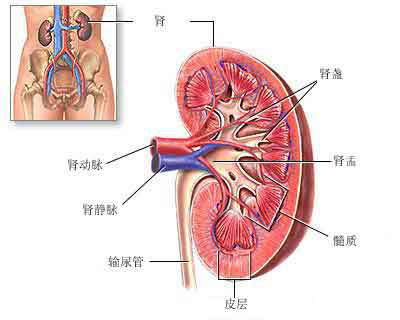“I never thought that after a lifetime of giving out certificates as a teacher, I’d one day receive one myself during a hospital stay.” Sitting on her hospital bed at Fuda Cancer Hospital in Guangzhou, 72-year-old Ms. Zhao (pseudonym) tightly clutches a brightly colored certificate titled “Best Recovery Warrior.” Under the dual shadows of coronary heart disease and cancer, this certificate has become a beacon of hope in her life.
A Dilemma Between Treating Heart Disease and Kidney Tumor
Ms. Zhao, a retired teacher from Inner Mongolia, had been enjoying a peaceful retirement until a routine health checkup in May disrupted her life. Ultrasound and enhanced CT scans revealed a 5.9 cm mass in her left kidney. Though she had occasionally experienced frequent and urgent urination, she had dismissed it as a normal part of aging. The diagnosis hit like a thunderbolt.
Seeking professional and reliable care, she traveled to a major hospital in Guangzhou. In less than two weeks, the tumor had grown to 9.6 cm. Worse still, cardiac examinations revealed severe coronary heart disease — with total blockage in the left anterior descending and circumflex arteries, and 70% stenosis in the mid-right coronary artery. This meant any major surgery carried a high risk of intraoperative myocardial infarction or heart failure.
Doctors offered two options, both difficult:
Option 1: Undergo coronary bypass surgery first, wait three months, then remove the kidney;
Option 2: Proceed directly with surgery to remove the kidney, but risk needing dialysis, ICU monitoring, or even not surviving the operation.
Ms. Zhao and her family found both options unacceptable.
Feeling hopeless, she considered giving up. But her children were not ready to let go. They sought medical advice everywhere and eventually, through the recommendation of an interventional radiology professor, learned about cryoablation — a less invasive alternative suitable for elderly, frail patients with heart conditions. After discovering that Dr. Niu Lizhi, president of Fuda Cancer Hospital, was an expert in cryoablation, the family immediately traveled to Fuda’s Medical Oncology Department I to seek help.
Multidisciplinary Collaboration Leads to Safe, Customized Treatment Plan
Ms. Zhao’s condition was extremely complex upon admission:
The tumor had nearly engulfed her entire kidney, and her ejection fraction was only 39% (normal is 50–70%). On one side was life-threatening heart disease; on the other, a potentially deadly kidney tumor. How could she survive this double threat?
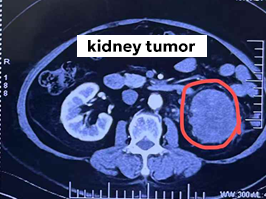
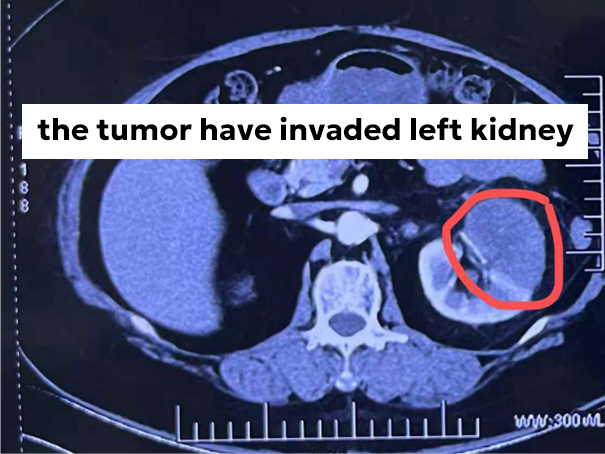
Fuda’s Medical Oncology Department I quickly initiated a multidisciplinary team consultation, developing a personalized, staged treatment plan:
Stage 1: Stabilize the Heart
Continuous monitoring and comprehensive supportive care to ensure cardiac stability.
Stage 2: Control the Kidney Tumor
Use arterial infusion chemotherapy combined with arterial embolization to halt tumor growth, buying time for the next phase.
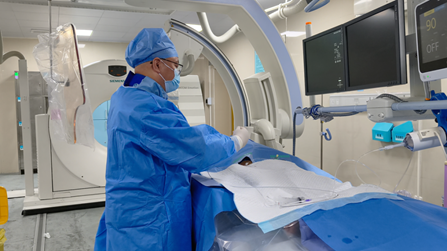
△ Dr. Zhong Xiaojun, Deputy Chief of Interventional Radiology, administering treatment
Stage 3: Cryoablation
Once blood tests, cardiac enzyme levels, echocardiography, and CT scans showed stability, cryoablation was performed to control the tumor while minimizing cardiac stress.
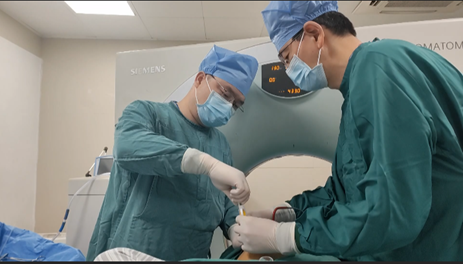
△ President Niu Lizhi and Assistant Director Long Xinan performing the cryoablation procedure
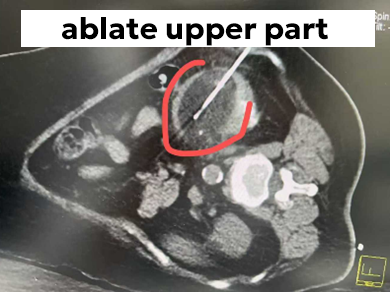
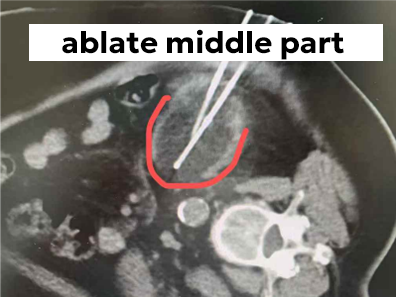
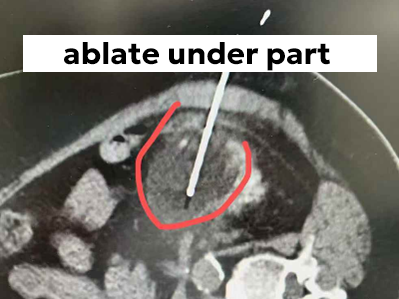
This process was like a well-coordinated relay race, with every step critical to the outcome. However, Ms. Zhao was terrified upon learning she’d need ICU monitoring after the procedure, as she associated ICU with severe illness. She even feared she might not survive the operation. With patient explanations and warm encouragement from Dr. Niu and the nursing team, she finally found the courage to proceed.
“The result was better than expected.”
After surgery, she experienced no significant discomfort. Following a day and night of close ICU observation, she emerged full of energy, telling her waiting children:
“Kids, I did it! I made it through the battle!”
A Special Certificate, A Medal of Resilience
Thanks to the superb skills of Dr. Niu and the entire medical team, along with the unwavering love and support of her children, Ms. Zhao cooperated fully with treatment. Her key health indicators stabilized, and she was eventually discharged with a very promising recovery.
Upon discharge, a heartfelt ceremony moved her to tears:
The nurses who had cared for her presented her with a “Best Recovery Warrior” certificate. Her children, who had stood by her throughout, received “Best Caregiver” certificates.
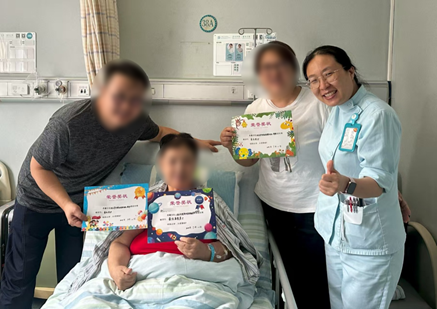
“You’ve all been so kind to me. Coming here felt like coming home,” Ms. Zhao said, gently stroking the bright red certificate with emotion.
From the detailed admission process to the warm bedside care, from the customized treatment plan to the expert medical procedures, and most importantly, the family-like compassion of the medical staff — everything made her feel deeply cared for. This former teacher, who had once handed out countless awards to students, never imagined she would one day receive such a precious ‘Honor of Life’ in a hospital room.
She and her children even wrote a heartfelt thank-you letter to the staff, expressing their deepest gratitude word by word.
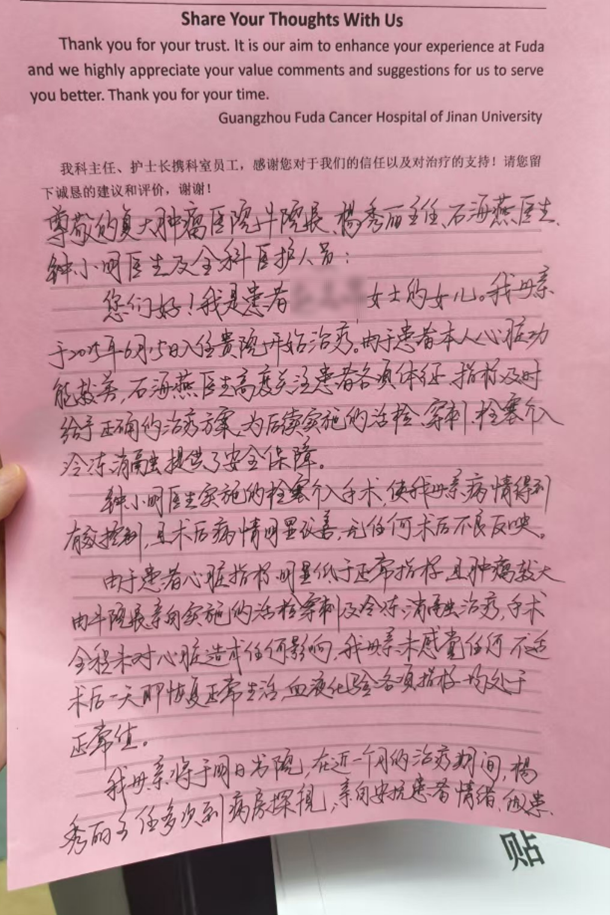
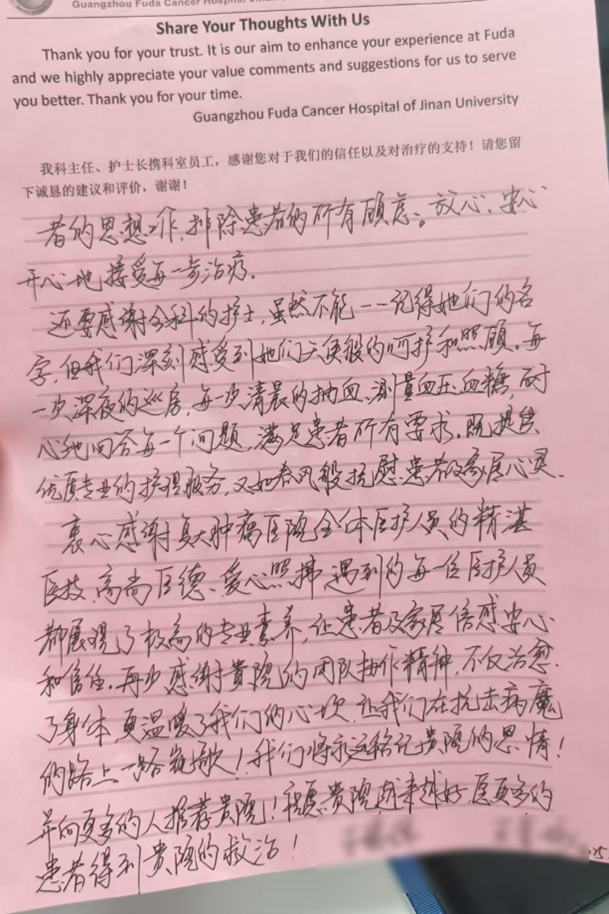
More Than Just a Certificate
This simple certificate is far more than just a piece of paper.
It represents the Medical Oncology Department I's dedication to combining science with heartfelt care. It is a tribute to Ms. Zhao’s strength and cooperation — and a symbol of encouragement for all patients.
Through these “award ceremonies,” Fuda Cancer Hospital aims to spread optimism and hope, inspiring more patients to face life with a positive mindset. Even wards filled with the scent of disinfectant can shine with the light of life and anticipation.
May every patient find their beacon of life through scientific treatment and compassionate care — and move forward with courage!
